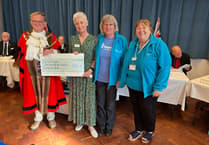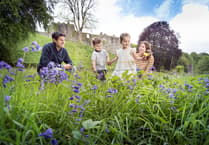Samuel James Rich, Mayor 1935/36, 1936/37 and 1937/38 THE first native of Okehampton to be elected three years in succession since 1623 when the town was incorporated by Royal Charter ? he died in office on August 20, 1938. When Samuel James Rich accepted the invitation to become Mayor of Okehampton in October 1935, he had only returned to his home town four years previously and had been a member of the town council for just three years. He was, at the time, chairman of the finance committee, chairman of the market and horses committee and the town council representative on the public assistance committee. A native of Okehampton, Mr Rich was the son of the late Mr and Mrs James Rich, formerly of North Street, Okehampton. He commenced his career in the boot and shoe trade, and was in the employment of Messrs German and Sons, Clapps Mill, Okehampton, for 16 years, before taking a business of his own. During his youth in Okehampton he was a well known athlete, was prominently associated with the social life of the town, a member of the local Volunteers and Territorials. At the age of 36, Mr Rich abandoned his lathe and migrated to Gloucester, where he purchased the Golden Fleece Hotel and later the Monks Retreat. Then he moved to Burnham-on-Crouch, Essex, as the owner of the White Hart Hotel, a business which he sold. In 1914 he went to India with his battalion ? the 1/6th Devons (TA). In 1931, Mr Rich came back to his native town to live in retirement. He held the offices of president of Okehampton and District Fatstock Society and president of Okehampton Rugby Club. When secretary of Okehampton Carnival Committee in 1933 he supervised the ox roasting, a feature he introduced in the carnival proceedings and continued for several years. Speaking to a Western Morning News reporter on his election, Mr Rich said the council had a very busy and important time in front of it with the building of the new Town Hall and the Simmons Homes. Great attention, he said, would also have to be paid to the water question and he hoped definite improvements would be made before next summer. Mr Rich certainly had a hectic three terms as Mayor, the most important of which was the coronation festivities for the borough of Okehampton of King George VI on Wednesday, May 12, 1937. With a strong team of councillors and officers involved as chairman and sub-committee members, the day went without any problem, starting with a peal of the church bells at 7.30am, then with sports in Fore Street at 8am, continuing throughout the day until after midnight. All children under 15 were presented with coronation souvenirs, many of which are seen to this day. Mr and Mrs Rich subsequently made gifts of gold and enamel jewels as part of the Mayor and Mayoress?s chains in memory of the coronation. There were further memorials to the coronation. August 1937 saw Mr Rich formally open the new pavilion in the pleasure grounds as another link to Okehampton?s progress. It was octagonal and well designed by the borough surveyor, R Alan Brunskill. It had been built facing the four points of the pleasure grounds used by the public, the bowling and putting green areas, the tennis courts and the pleasure grounds themselves. Although demolished in 2004, this pavilion has given enjoyment to countless people. Young children were not forgotten. Progress continued with the official opening of the paddling pool and sandpit in September 1937, towards which Mr Rich seems to have made a substantial donation. The large extension to the grammar school was opened by Lord Carrington and Mr Rich. It wasn?t just the coronation that caused celebration in Okehampton. The Carlton cinema was opened in May 1937 and described at the time as one of the most up to date of its time and a useful addition to the amenities of the town. Not to be outdone, the Premier Cinema (formerly the Okehampton Picture Palace) had a major facelift. Mr Rich served under three kings, first George V, then Edward VIII, who reigned for 324 days uncrowned. Arrangements had been made for his coronation on May 12, 1937. However, he abdicated, but the coronation date remained, with the crown being placed on his brother, the Duke of York. Unfortunately, he had come to the throne under the steadily lengthening shadows of crisis and conflict. Mr Rich represented Okehampton well, chairing local important meetings on the subject of air raid precautions (ARP). Surgeon-Captain A Woollcombe (retired) of Station Road, Okehampton, was initially appointed the air raid precaution organiser for the borough. Even at this particularly serious occasion there was time for laughter when Dr Woollcombe confirmed that beards were ?taboo? as respirators would not function with long whiskers onside, so chins would have to be shaved! At another council meeting when Dr E D Allen-Price had been appointed the new ARP organiser, there was an animated discussion when he had booked storage for respirators etc at four shillings (20p) a week rent. Some councillors felt this was too much and that a store could be rented at one shilling (5p) per week. There were also discussions on the use of Oaklands House as a casualty station in the event of war. Mayor Sam Rich chaired his last council meeting on August 20, 1938, waved a cheery goodbye to his fellow councillors and officers and invited popular local journalist Jack Hellier to join him for a sherry, which Jack unfortunately had to refuse. Mr Rich, in making his way home to Station Road, collapsed in the Arcade and died. Mr Rich, in seven years on his return to Okehampton, had contributed to the borough and will be remembered for his unstinting generosity. Hilary and Mike Wreford


-charity-shop-on-West-Street-in-Okehampton.jpeg?width=209&height=140&crop=209:145,smart&quality=75)
